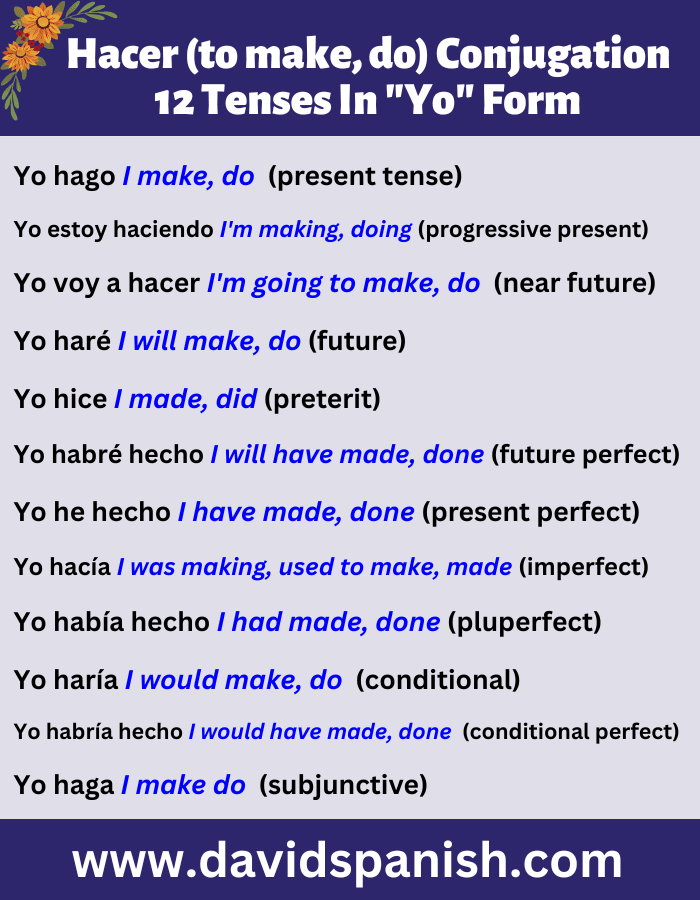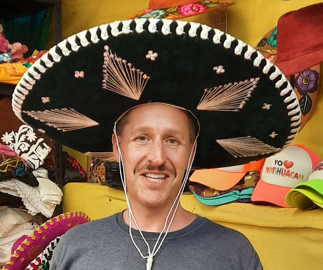
Hacer (Meaning: to make, to do) is one of the most common and versatile verbs in the Spanish language. The conjugation of hacer in the present tense is: Yo hago (I make, do), tú haces (you make, do), él/ella/usted hace (he, she makes/does; you make, do), nosotros hacemos (we make, do), vosotros hacéis (you make, do), ellos/ellas/ustedes hacen (you/they make, do).

The Spanish verb hacer (to make, to do), is an irregular ER verb. The verb is irregular because its stem in the first-person singular (yo) form is different to other regular ER verbs. This page on our site covers Spanish ER verbs in detail.
This page provides hacer conjugation charts with example sentences (see below) in the following most commonly used verb tenses:

Hacer is an essential verb for the beginner to learn as the language uses it in many everyday situations and expressions.
Use hacer when talking about the weather. For example:
Use hacer to express how long an action has been occurring. For example:
The from desde hace also works for answering this question:
The Spanish language employs hacer in many expressions and idioms. For example:

Translations for yo hago in the present tense include “I make”, “I do”, “I am making” and “I am doing”.
| yo hago | I make, do | Yo hago mi tarea. | I do my homework. |
| tú haces | you make, do | Tú haces tu cama. | You make your bed. |
| él/elle, usted hace | he, she makes/does; you make/do | Él hace un viaje con su family. | He takes a trip with his family. |
| nosotros hacemos | we make, do | Nosotros hacemos una pizza. | We make a pizza. |
| vosotros hacéis | you make, do | Vosotros hacéis daño al medio ambiente. | You are harming the environment. |
| ellos/ellas, ustedes hacen | they, you make, do | Ellos hacen ejercicio. | They work out. |
The Spanish progressive tense combines the present tense of estar (to be) and the present participle. Yo estoy haciendo translates to “I am making” or “I am doing”.
| yo estoy haciendo | I am making, doing | Yo estoy haciendo mi trabajo. | I'm doing my work. |
| tú estás haciendo | you are making, doing | Tú estás haciendo ejercicio. | You are working out. |
| él/ella, usted está haciendo | he/she is making, doing; You are making, doing | Ella está haciendo un pastel. | She is making a cake. |
| nosotros estamos haciendo | we are making, doing | Nosotros estamos haciendo pan. | We are making bread. |
| vosotros estáis haciendo | you are making, doing | Vosotros estáis haciendo un viaje a Málaga. | You are taking a trip to Malaga. |
| ellos/ellas, ustedes están haciendo | they, you are making, doing | Ellos están haciendo el desayuno. | They are making breakfast. |
The near future tense consists of the present tense of ir (to go) followed by the preposition a and an infinitive. Yo voy a hacer translates to “I am going to make” and “I am going to do”.
| yo voy a hacer | I'm going to make, do | Yo voy a hacer las galletas. | I'm going to make the cookies. |
| tú vas a hacer | you are going to make, do | Tú vas a hacer un bocadillo. | You are going to make a sandwich. |
| él/ella, usted va a hacer | he/she is going to make do; you are going to make, do | Ella va a hacer un viaje con sus niños. | She is going to take a trip with her kids. |
| nosotros vamos a hacer | we are going to make, do | Nosotros vamos a hacer una pelicula. | We are going to make a movie. |
| vosotros vais a hacer | you are going to make, do | Vosotros vais a hacer al maestro. | You are going to pay attention the teacher. |
| ellos/ellas, ustedes van a hacer | they, you are going to make, do | Ellos van a hacer una paella española. | They are going to make a Spanish paella. |
In the future tense, yo haré translates to “I will make” and “I will do”.
| yo haré | I will make, do | Yo haré una fiesta por los niños. | I will make a party for the kids. |
| tú harás | you will make, do | ¿Qué harás a Colombia? | What will you do in Colombia? |
| él/ella, usted hará | he/she/you will make, do | Él hará caso a sus amigos. | He will listen to his friends. |
| nosotros haremos | we will make, do | Nosotros haremos un viaje a los Alpes franceses. | We will take a trip to the French Alps. |
| vosotros haréis | you will make, do | Vosotros haréis las tapas por los invitados. | You will make tapas for the guests. |
| ellos/ellas, ustedes harán | they/you will make, do | Ellos harán los postres por el banquete. | They will make deserts for the banquet. |
The preterite tense is used to express past actions which occurred at defined times. Yo hice translates to “I make” and “I did”.
| yo hice | I make, did | Yo hice el helado. | I made the ice cream. |
| tú hiciste | you made, did | ¿Qué hiciste ayer? | What did you do yesterday? |
| él/ella, usted hizo | he/she/you made, did | Usted hizo los churros mexicanos. | You made Mexican fritters. |
| nosotros hicimos | we made, did | Nosotros hicimos las tortillas de harina. | We made flour tortillas. |
| vosotros hicisteis | you made, did | Vosotros hicisteis una lasaña. | You made a lasagna. |
| ellos/ellas, ustedes hicieron | they/you made, did | Ellos hicieron un viaje a Asunción. | They took a trip to Asunción. |
The present perfect indicative tense combines the present tense of haber (to have) with the past participle. Yo he hecho translates to “I have made” and “I have done”.
| yo he hecho | I have made, done | Yo he hecho progresos últimamente. | I have made a lot of progress recently. |
| tú has hecho | you have made, done | ¿Qué has hecho hoy? | What have you done today? |
| él, ella, usted ha hecho | he/she has made, done; you have made, done | Él no ha hecho nada ayer. | He didn't do anything yesterday. |
| nosotros hemos hecho | we have made, done | Nosotros hemos hecho muchísimas actividades este verano. | We have done a lot of activities this summer. |
| vosotros habéis hecho | you have made, done | ¿Qué habéis hecho últimamente? | What have you done recently? |
| ellos/ellas, ustedes han hecho | they/you have made, done | Ellos han hecho los postres por la cena. | They have made the desserts for the dinner. |
The imperfect tense is used to describe past action which occurred repeatedly at undefined times. Yo hacía translates to “I was making/doing”, “I used to make/do”, “I made” and “I did”.
| yo hacía | I used to make/do, was making/doing, made, did | Yo hacía caso a los adultos cuando era niño. | I used to listen to adults when I was a child. |
| tú hacías | you used to make/do, were making/doing, made, did | ¿Qué hacías cuando te llamé? | What where you doing when I called? |
| él/ella, usted hacía | he/she/you used to make/do, was (were) making/doing, made, did | Ella hacía su tarea cuando papá llegó. | She was doing her homework when dad arrived. |
| nosotros hacíamos | we used to make/do, were making/doing, made, did | Nosotros hacíamos una pizza cuando saliste. | We were making a pizza when you left. |
| vosotros hacíais | you used to make/do, were making/doing, made, did | Vosotros hacíais galletas cuando erais jovenes. | You used to make cookies when you were young. |
| ellos/ellas, ustedes hacían | they/you used to make/do, were making/doing, make, did | Ellos hacían los deberes cuando mamá llamó. | They were doing homework when mom called. |
The conditional tense is used to express hypothetical actions. Yo haría translates to “I would make” and “I would do.
| yo haría | I would make, do | Yo haría mi trabajo si fuera más disciplinado. | I'd do my work if I were more disciplined. |
| tú harías | you would make, do | ¿Qué harías si tuviera más dinero? | What would you do if you had more money? |
| él/ella, usted haría | he/she/you would make, do | Ella haría un pastel si tuviera los ingredientes. | She's make a cake if she had the indredients. |
| nosotros haríamos | we would make, do | Nosotros haríamos un viaje si tuviéramos el día libre. | We'd take a trip if we had the day off. |
| vosotros haríais | you would make, do | Vosotros haríais un viaje en España si tuvierais vuestros pasaportes. | You'd take a trip to Spain if you had your passports. |
| ellos/ellas, ustedes harían | they/you would make do | Ellos harían una pizza si tuvieran el queso. | They'd make a pizza if they had the cheese. |
The subjunctive mood is used to express wishes, emotions and doubts. Yo haga translates to “I make” and “I do”.
| yo haga | I make, do | Es importante que haga un esfuerzo. | It's important that I make an effort. |
| tú hagas | you make, do | Estoy feliz que hagas tu trabajo. | I'm happy you're doing your work. |
| él/ella usted haga | he/she makes, does; you make, do | Es dudoso que él haga caso. | It's doubtful that he's paying attention. |
| nosotros hagamos | we make, do | Él quiere que hagamos una fiesta. | He wants us to throw a party. |
| vosotros hagáis | you make, do | Es mejor que vosotros hagáis un viaje a Costa Rica. | It's better that you take a trip to Costa Rica. |
| ellos/ellas, ustedes hagan | they/you make, do | Es importante que ellos hagan la comida. | It's important that they make the meal. |
David is a lifelong student and teacher of languages. When he's not working on this website, he's watching Spanish TV, practicing Spanish with the people in his community, hiking, biking or skiing.
Latest posts by David Issokson (see all)
¡Hola! My name is David Issokson. I'm based in Victor, Idaho (near Jackson, Wyoming). I am here to help you throughout your adventures learning Spanish!